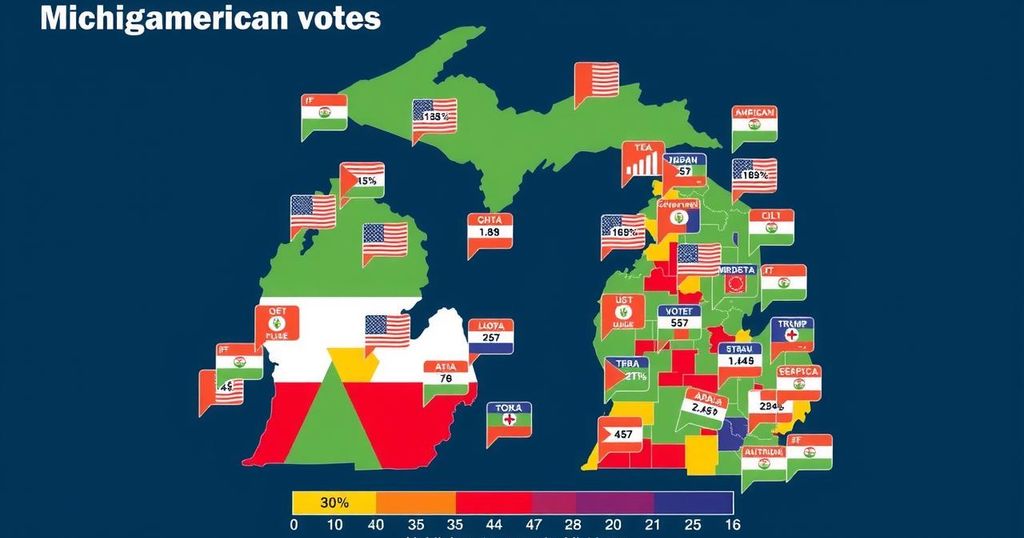In Michigan, a notable trend emerges as Arab-American voters, historically aligned with the Democratic Party, begin to shift towards supporting Donald Trump. This change stems from discontent with the current administration’s policies, particularly regarding the unrest in Gaza and Lebanon, and a perceived lack of engagement by Kamala Harris. Community leaders articulate frustrations over cultural impositions while expressing a desire for political representation that reflects their concerns. This shifting allegiance in a pivotal swing state could have significant implications for the upcoming election.
The political landscape in Michigan reveals a striking trend as Arab-American voters, traditionally aligned with the Democratic Party, exhibit a noticeable shift towards supporting Donald Trump in the upcoming election. This unexpected move is largely fueled by their discontent with current policies related to the ongoing unrest in Gaza and Lebanon, as well as a perceived failure of the Democratic establishment, particularly Democratic candidate Kamala Harris, to address their concerns effectively. In communities such as Dearborn and Hamtramck, distinctive transformations in voting sentiment have surfaced, illustrating a complex interplay between local dissatisfaction and broader cultural issues. Notably, local high school students express a preference for Trump over Harris, citing uncertainty about Harris’s potential contributions and a desire for change amidst perceived neglect by the Democratic Party. The Mayor of Hamtramck, Amer Ghalib, who recently endorsed Trump, emphasized a combination of disappointment with Biden and Harris’ administration and hope for favorable changes under Trump. He pointed out frustrations over social issues and cultural impositions that have created a rift between the Arab-American community and the Democratic Party. Notably, Trump’s visit to Detroit reflects the strategic efforts of his campaign to engage with voters in key demographic areas, underscoring the significance of the Arab-American bloc in determining Michigan’s electoral outcome. Despite Trump’s controversial stance on Middle Eastern policies, there is a belief among some Arab-American voters that his administration may yield better results than the current administration, especially regarding the Israel-Gaza conflict. Additionally, there is a notable sentiment within the community that the Democrats have been ineffective in addressing their needs. Some voters articulate their opposition to the current policies as exacerbating issues like perceived violence and marginalization, leading to an increased willingness to support a candidate like Trump who embodies a sense of unpredictability and potential change. This evolving narrative within Michigan’s Arab-American populace signals a concerning trend for the Democratic Party, indicating they may have unintentionally alienated a crucial voting bloc. As the election approaches, the ramifications of this shift could heavily influence the vote in Michigan, a state crucial to the broader electoral battle. The growing support for Trump among Arab-Americans serves as a critical reminder of the intricate and often contradictory nature of political affiliations in America, particularly within communities that feel disregarded by established political norms.
Michigan has emerged as a key battleground state in American elections, particularly because of its significant Arab-American population, which comprises a vital voting demographic. Over the years, many Arab-Americans have historically aligned themselves with the Democratic Party; however, recent political developments have led to dissension within this community. The onset of violence in the Middle East, specifically the unrest in Gaza and Lebanon, alongside local and national Democratic policies, have propelled some Arab-Americans to reconsider their political allegiances and look towards the Republican nominee, Donald Trump. This shift underscores a broader trend of disillusionment with the Democratic Party, particularly in socio-political contexts that resonate with Arab-American voters.
In conclusion, the shift of Arab-American voters towards Donald Trump in Michigan highlights a significant realignment of political loyalties driven by dissatisfaction with the Democratic Party’s handling of both international and domestic issues. As this community seeks recognition and engagement, the evolving political preferences signal a potential reshaping of electoral dynamics in a state where margins are crucial. This narrative illustrates the complex interconnections between cultural identity, political representation, and the evolving electoral landscape in the United States.
Original Source: news.sky.com






